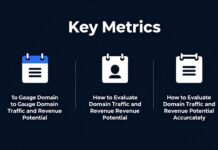Are you intrigued by the world of domain flipping? This lucrative business model offers the potential for substantial profits, but it comes with its own set of challenges. In this article, we’ll delve into the essential tips for success in domain flipping, while highlighting common pitfalls to avoid. Whether you’re a seasoned investor or a newbie, understanding these key strategies can help you navigate the volatile landscape of domain trading.
Many people dive into domain flipping with dreams of quick cash, but without the right knowledge, they can easily sink their funds into domains that are virtually worthless. So, what can you do to ensure your success and maximize your profits? We’ll explore proven methods for identifying valuable domains, conducting proper research, and leveraging market trends. Avoiding these pitfalls is crucial because the difference between a good investment and a poor one can be just a few clicks away.
Additionally, we will uncover the trending topics that can elevate your domain flipping game, such as SEO optimization, branding, and current market demands. Are you ready to uncover the secrets that successful domain flippers know? By the end of this article, you will be equipped with valuable insights that can help you make informed decisions and avoid costly mistakes. So, let’s dive in and discover how to navigate the exciting yet risky world of domain flipping!
Top 7 Mistakes to Avoid When Flipping Domains: Protect Your Investment
Flipping domains has become increasingly popular, and many people are looking to make quick profits. However, it’s not as easy as it seems. Many new investors find themselves in trouble due to common mistakes that could have been avoided. If you want to succeed in the domain flipping business, you need to be aware of the pitfalls and how to steer clear of them. Here are the top 7 mistakes to avoid when flipping domains.
1. Not Doing Enough Research
One of the biggest mistakes newbie flippers make is jumping into the market without adequate research. It’s important to understand the value of a domain. You should:
- Check historical sales data of similar domains.
- Analyze keyword popularity and trends.
- Look at the potential for development or resale.
Not doing this could lead to investing in domains that have no demand, thus wasting your money.
2. Ignoring SEO Considerations
Domains that are SEO-friendly usually fetch a higher price. Many flippers overlook this aspect, thinking that any catchy name will sell. You should pay attention to:
- Length of the domain (shorter is usually better).
- Use of keywords that people are searching for.
- The domain extension (.com, .net, etc.) and its popularity.
Ignoring these factors could mean less visibility for your domain, making it harder to sell.
3. Overpricing Your Domain
Setting a price that’s too high can scare off potential buyers. You might think you have a goldmine, but if the price is not in line with market value, then it won’t sell. To price your domain correctly:
- Look at similar domains that have sold recently.
- Consider the age of the domain.
- Think about the branding potential.
A common error is to get emotionally attached to a domain, leading to inflated pricing.
4. Neglecting Legal Issues
Domain flipping can come with legal issues, especially if you’re not careful. Some common legal pitfalls include:
- Trademark infringement: Make sure the domain doesn’t violate any trademarks.
- Copyright issues: Check if the domain name closely resembles a copyrighted brand.
- Registration problems: Ensure that the domain is fully available and not locked by previous owners.
Failing to address these legal matters could lead to losing your investment.
5. Not Having a Clear Strategy
Many flippers enter the market without a clear plan. This can lead to confusion and wasted efforts. Some strategies to consider include:
- Holding domains for long-term appreciation versus flipping quickly.
- Focusing on specific niches where you can build expertise.
- Diversifying your portfolio to spread risk.
Not having a strategy can lead to poor decision-making and financial losses.
6. Failing to Market Your Domain
Even the best domains won’t sell if no one knows they’re available. You need to actively market your domains. Here’s what you can do:
- List your domains on popular marketplaces.
- Use social media to promote your domains.
- Network with other domain investors to get the word out.
Failing to market can leave you with unsold domains, which is not ideal for your investment.
7. Giving Up Too Soon
Domain flipping can be a slow process, and many flippers give up too quickly when they don’t see immediate results. It’s essential to understand that patience is key. Building a successful flipping business takes time and persistence. Here are some tips to keep in mind:
- Keep track of your progress and learn from mistakes.
- Stay updated on market trends.
- Be willing to adapt your strategy based on what you learn.
Giving up too soon can mean missing out on future profits.
In summary, flipping domains can be a lucrative venture if approached correctly. By avoiding these common mistakes, you can protect your investment and increase your chances of success. With research, a clear strategy, and effective marketing, you can turn domain flipping into a profitable endeavor. Remember, learning from errors and staying informed is essential in this ever-evolving marketplace. Happy flipping!
The Ultimate Guide to Domain Valuation: How to Spot Hidden Gems
When it comes to domain flipping, understanding the true value of a domain name can be the difference between landing a lucrative sale or just a waste of money. Many people jump into this market without having a clear strategy for domain valuation. The Ultimate Guide to Domain Valuation is here to help both newbies and seasoned flippers spot hidden gems and avoid pitfalls that could lead to significant losses.
Understanding Domain Valuation
Domain valuation isn’t just about what someone is willing to pay for a domain name. There is a science behind it, and knowing the right metrics can make or break your flipping game. Factors like length, keywords, extension, and brandability are crucial.
- Length: Shorter domain names tend to be more valuable. They are easier to remember and type.
- Keywords: Domains containing popular keywords relevant to a specific industry can fetch higher prices.
- Extension: While .com domains are generally more valuable, other extensions like .net, .org, or newer ones like .io can also be worth a lot in certain contexts.
- Brandability: A name that sounds good and is easy to spell is more likely to attract buyers.
Tools for Valuation
There are several tools available that can help in estimating a domain’s value. They use algorithms to analyze various factors. Some commonly used tools include:
- Estibot: This tool provides automated domain appraisals based on numerous metrics.
- GoDaddy Domain Appraisal: Offers a free appraisal service that gives a range of estimated values.
- NameBio: A historical database of domain sales that can give insight into what similar domains have sold for.
Spotting Hidden Gems
Finding undervalued domains can be a treasure hunt. Here are some strategies to help you discover those hidden gems.
- Expired Domains: Look for domains that have expired. They may have established backlinks, which can add value.
- Misspellings of Popular Brands: Sometimes, common misspellings or typos of popular brand names can be worth something.
- Niche-Specific Domains: Focus on domains that cater to a specific niche, which might be overlooked by larger investors.
Avoiding Pitfalls in Domain Flipping
While domain flipping can be profitable, it is not without its risks. Here are some pitfalls to watch out for:
- Overpaying for Domains: Just because a name sounds great doesn’t mean it’s worth the price tag. Always do your research.
- Ignoring Legal Issues: Make sure the domain doesn’t infringe on trademarks. Legal trouble can wipe out your profits.
- Holding Out for Too Long: If your domain isn’t selling, consider lowering the price instead of waiting indefinitely.
Essential Tips for Success
To thrive in the domain flipping business, keeping a few essential tips in mind can guide you toward success.
- Stay Informed: The domain market can change rapidly. Stay updated on trends and news in the industry.
- Network with Other Flippers: Join forums or social media groups to connect with other domain investors. Sharing knowledge can be invaluable.
- Keep an Eye on Auctions: Domains are often sold at auctions. This can be a great way to snag valuable names at lower prices.
Examples of Successful Domain Flips
To illustrate how lucrative domain flipping can be, here are a few examples of successful flips:
- Voice.com: Sold for $30 million in 2019, this is one of the highest domain sales ever.
- 360.com: Went for $17 million, showcasing the value of a short, memorable name.
- Sex.com: Sold for $13 million, proving that even controversial names can command high prices.
Key Takeaways
When diving into the world of domain flipping, it’s vital to have a clear understanding of domain valuation and the factors that influence it. Using the right tools and strategies can help you spot hidden gems while avoiding common pitfalls. Remember, the domain market is dynamic, and staying informed is critical.
In the end, with patience, research, and a bit of luck, you can turn domain flipping into a profitable venture. Happy flipping!
5 Proven Strategies to Maximize Your Domain Resale Value
Flipping domain names can be a lucrative business, but it also comes with its fair share of traps and pitfalls. Many people dive in without understanding all the nuances, only to find themselves with domains that are worth less than what they paid. If you’re looking to maximize your domain resale value, you need to be strategic and informed. Here’s five proven strategies that can help you avoid common mistakes in domain flipping and set you up for success.
1. Choose the Right Domain Name
Selecting the right domain name is crucial. It’s not just about picking something catchy; it’s about understanding what makes a domain valuable. Generally, short, memorable, and keyword-rich domains have a higher resale value. Consider these factors when choosing:
- Length: Aim for 1-3 words. Shorter names are easier to remember.
- Keywords: Names that include popular search terms can attract more buyers.
- Extension: .com domains tend to sell for more compared to others like .net or .info.
For example, “bestcars.com” is more valuable than “best-cars-today.net” simply because of its brevity and popularity.
2. Build a Brand Around Your Domain
Creating a brand can significantly increase your domain’s value. A domain that already has an established brand or website is more appealing to potential buyers. Here’s what to consider:
- Website Development: Even a simple landing page can show that the domain has been utilized.
- Social Media Presence: Secure social media accounts with the same name, which further solidifies the brand.
- SEO Optimization: Optimize your domain with relevant content to boost its visibility in search engines.
By building a brand, you turn your domain into an asset, making it more attractive for resale.
3. Monitor Market Trends
Understanding the market trends is essential. The domain market can fluctuate based on numerous factors such as technology trends, consumer behavior, and economic conditions. Here’s how to keep track:
- Follow Domain Marketplaces: Websites like Sedo, Flippa, and GoDaddy Auctions provide insights into what domains are selling and at what prices.
- Use Tools: Platforms like Estibot can help you evaluate domain values based on current market trends.
- Network: Join forums and groups related to domain flipping. Engaging with other flippers can provide you with valuable insights.
Being aware of what’s hot and what’s not is a key to making informed decisions.
4. Avoid Common Pitfalls
Domain flipping is not without its risks, and many newcomers fall into common traps. Here are pitfalls to watch out for:
- Overpaying for Domains: Don’t get caught in bidding wars. Stick to your budget.
- Ignoring Renewal Fees: Some domains have high renewal fees that can eat into your profits.
- Lack of Research: Failing to research a domain’s history can lead to purchasing a domain with a bad reputation.
For example, a domain that was previously associated with spam might be flagged by search engines, making it harder to sell.
5. Leverage Marketing Strategies
Once you have a domain, you need to market it effectively. Prospective buyers need to know your domain is available. Here’s how to do that:
- List on Multiple Marketplaces: Don’t limit yourself to one platform. List your domain on several marketplaces to increase visibility.
- Use Social Media Ads: Promote your domain through social media channels where potential buyers might be looking.
- Email Marketing: Reach out directly to businesses that might benefit from your domain name.
This way, you can broaden your potential buyer pool and increase your chances of a successful sale.
Final Thoughts
Maximizing your domain resale value does not have to be a guessing game. By following these strategies, you can navigate the domain flipping landscape more effectively. Remember that each domain is unique and requires its own strategy. Keep learning and adapting to market changes, and you’ll find success in this dynamic field. Embrace the journey, and you might just turn those domains into a profitable venture.
Are You Making These Common Domain Flipping Blunders? Find Out Now!
Flipping domains can be a lucrative venture for many, but it’s also fraught with risks. Many people are getting into the domain flipping game without fully understanding all the ins and outs. If you’re wondering, “Are You Making These Common Domain Flipping Blunders? Find Out Now!” then you’re in the right place. There are several pitfalls that can trip up even the most seasoned investors, and knowing what they are is crucial for success.
Common Mistakes in Domain Flipping
Many newbies jump into domain flipping thinking it’s easy. However, many make mistakes that can cost them dearly. Here are some common blunders:
Neglecting Market Research: Failing to research the market can lead to poor purchasing decisions. Just because a domain sounds catchy doesn’t mean it will sell. Look for trends and demand.
Overpricing Domains: Setting an unrealistic price can deter potential buyers. It’s important to price your domains competitively based on market value and comparable sales.
Ignoring SEO Value: Domains with strong SEO potential often sell for higher prices. Not considering keywords and search volume can limit your earning potential.
Lack of Patience: Domain flipping is not a get-rich-quick scheme. Many people give up too soon, not realizing that some domains take time to appreciate in value.
Failing to Network: The domain flipping community is vast, and networking can provide valuable insights and opportunities. Ignoring this aspect can mean missing out on potential buyers or partnerships.
Essential Tips for Success in Domain Flipping
To avoid pitfalls in domain flipping, consider these essential tips:
Do Your Research: Look into what types of domains are selling well. Websites like NameBio provide historical sales data, which can help you make informed decisions.
Choose the Right Domain Extensions: While .com domains are often preferred, other extensions like .io or .co can also be valuable, especially in tech spaces.
Keep Your Portfolio Diverse: Don’t put all your eggs in one basket. Having a variety of domains in different niches can hedge against market fluctuations.
Stay Updated on Trends: The digital landscape changes quickly. Regularly check industry news for trends that could influence domain values. Follow blogs and forums to stay informed.
Utilize Domain Auctions and Marketplaces: Sites like GoDaddy Auctions, Flippa, and Sedo offer platforms to buy and sell domains. Engaging in auctions can also give you a sense of market value.
Avoiding Common Pitfalls: A Quick Checklist
Here’s a checklist to help you avoid common pitfalls:
- [ ] Conduct thorough market research before buying.
- [ ] Set realistic pricing based on data.
- [ ] Evaluate the SEO potential of domains.
- [ ] Be patient; some sales take time.
- [ ] Engage in networking within the domain community.
The Importance of Domain Quality
Quality should never be compromised. Domains that are short, memorable, and easy to spell usually perform better. For instance, a domain like “BestPizzaNYC.com” may attract more attention than “PizzaNYC2019.com.” The former is concise and relevant, while the latter is dated.
Examples of Successful Domain Flips
Learning from successful flips can provide insights into what works. Here are some notable examples:
- Voice.com: Sold for $30 million in 2019, it illustrates how premium domains can fetch astonishing prices.
- Insurance.com: This domain sold for $35.6 million in 2010, highlighting the value of highly sought-after keywords.
Comparing Domain Extensions
Here’s a simple comparison of common domain extensions:
| Extension | Purpose | Value Potential |
|---|---|---|
| .com | Commercial businesses | High |
| .net | Network-related sites | Medium |
| .org | Non-profit organizations | Medium to High |
| .io | Tech startups | Increasingly popular |
| .co | Short for company | Medium |
Final Thoughts
In the realm of domain flipping, knowledge is power. Avoiding pitfalls requires diligence, research, and a willingness to learn from mistakes. By understanding common blunders, leveraging successful strategies, and keeping an eye on market trends, you can enhance your chances of success in this competitive landscape. The world of domain flipping has its challenges, but with the right approach, it can also be rewarding.
How to Choose the Right Domain Names: Expert Tips for Flipping Success
Choosing the right domain name is a crucial step in the world of domain flipping. Whether your’re a newbie or an experienced flipper, the importance of a strong domain name cannot be overstated. It’s like the real estate of the internet; the right one can lead to substantial profits, while a poor choice could result in wasted time and money. This article aims to provide expert tips on selecting domain names that sell, while also highlighting common pitfalls to avoid in domain flipping.
Understand the Value of Domain Names
Before you dive into the world of domain flipping, it’s essential to understand what makes a domain name valuable. There are several factors that contribute to a domain’s worth:
- Length: Shorter domain names are generally more valuable. They are easy to remember and quicker to type.
- Keywords: Domains that contain popular keywords can rank better in search engines, making them more appealing to buyers.
- Extension: The domain extension (like .com, .net, .org) plays a big role. .com domains are usually the most sought after, followed by .net and .org.
- Brandability: A domain that is catchy and offers branding potential is more likely to attract buyers.
For instance, a domain like “BestPizzaNYC.com” might be more appealing than “Pizza123.com” because it is specific, memorable, and includes a popular keyword.
Research Your Market
One of the most common pitfalls in domain flipping is not conducting enough research. You should take time to understand the market trends. Here are some steps to follow:
- Use Domain Name Generators: Tools like Lean Domain Search or NameMesh can help you brainstorm creative names based on keywords you want to target.
- Check Domain Sales Sites: Websites such as GoDaddy Auctions or Sedo can give you insights into what domains are selling and at what prices.
- Analyze Competitors: Look at what successful domain flippers are doing. Pay attention to the domains they purchase and how they market them.
Keep It Simple and Memorable
When you’re choosing a domain name, simplicity is key. Complicated or hard-to-spell names can deter potential buyers. Here’s what to consider:
- Avoid using hyphens or numbers, as these can confuse people.
- Choose names that are easy to pronounce and spell.
- Think about how it will look in print or on a business card.
For example, “NYCBagels.com” is straightforward and easy to remember, while “Bagels4U-NewYorkCity.com” might be too complex for potential customers.
The Importance of SEO
Search Engine Optimization (SEO) plays a vital role in the value of domain names. If a domain can rank well in search engines, it becomes more attractive to buyers. Here are some tips for optimizing your domain name for SEO:
- Include relevant keywords that potential customers might use when searching.
- Keep it short and to the point to improve click-through rates.
- Consider local SEO by including your city or region in the domain name if you’re targeting a specific audience.
Beware of Trademark Issues
One major pitfall in domain flipping is the risk of infringing on trademarks. Always do a trademark search before purchasing a domain name. Here’s how you can avoid legal troubles:
- Use the United States Patent and Trademark Office’s (USPTO) online database to check for existing trademarks.
- Be cautious with popular brand names, even if you think they can be sold as a domain.
- If a name sounds too similar to a well-known brand, it might not be worth the risk.
Pricing and Valuation Strategies
Once you have selected domain names, it’s time to think about pricing. A common mistake is overpricing domains. Here are some strategies to consider:
- Research Comparable Sales: Look at what similar domains have sold for to gauge a reasonable price.
- Use Domain Valuation Tools: Websites like Estibot can provide insights into the potential value of your domain.
- Be Flexible: Sometimes, you might need to lower your price to attract buyers.
Networking and Building Relationships
Networking is an often overlooked aspect of domain flipping. Building relationships within the industry can open doors for better deals and partnerships.
- Attend domain conferences or meetups to connect with other flippers.
- Join online forums or social media groups focused on domain flipping.
- Collaborate with others on joint ventures or flip opportunities.
Flipping domains can be profitable if you know what to look for and avoid common mistakes. By following these expert tips for choosing the right domain names and sidestepping pitfalls, you can position yourself for success in this competitive market. Remember, it takes time and persistence to master the art of domain flipping.
Conclusion
In conclusion, successfully navigating the world of domain flipping requires a strategic approach to avoid common pitfalls. Key considerations include thorough research to ensure domain quality and market demand, understanding the intricacies of domain valuation, and being wary of the potential for scams and legal issues. Additionally, patience and a clear exit strategy can greatly enhance your returns. As you embark on your domain flipping journey, remember that knowledge is your greatest asset; stay informed about industry trends and continuously refine your buying and selling strategies. Embrace the learning process and don’t be afraid to seek guidance from experienced flippers. By applying these principles and maintaining a proactive mindset, you can significantly increase your chances of success in this lucrative venture. Start today by evaluating your current portfolio or exploring new opportunities—your next big win might be just a domain name away!













